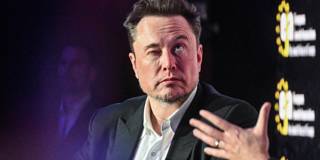Although Tesla appears to be wildly overvalued compared to rival automakers, its shareholders are betting that they can sell their holdings to a greater fool in the near future, and Elon Musk is eagerly indulging their speculative exuberance. None of it bodes well for company’s workers, suppliers, and other customers.
BERKELEY – From the standpoint of America and the world, Tesla is a historically important technology-generating enterprise – the tip of the spear in the transition away from internal-combustion-engine vehicles. From the standpoint of long-term shareholders, it has the potential to be a sustainable profit-making enterprise. From the standpoint of its suppliers, employees, and customers, it is a source of income and production. And from the standpoint of Wall Street speculators, it is a bouncing ball in a roulette wheel: a tech-bubble casino play.
In early 2018, Tesla’s board of directors and shareholders approved a pay package for CEO Elon Musk granting him 12 tranches of stock options, each equal to about 1% of the company’s total equity, valued fully at some $55 billion. The first tranche would vest if Tesla’s market capitalization surpassed $100 billion, and each successive tranche would vest when it rose another $50 billion (provided that the company also met various revenue and cash-flow targets).
That compensation package is now in the courts, where the Delaware Chancery has found that the process by which it was approved failed to meet the arms-length standard required of an executive who is also a shareholder with effective control over the company. Even so, Musk will probably prevail once all the legal i’s are dotted and t’s crossed. After all, the board is tame, and most Tesla shares are held by diehard Musk fans.

BERKELEY – From the standpoint of America and the world, Tesla is a historically important technology-generating enterprise – the tip of the spear in the transition away from internal-combustion-engine vehicles. From the standpoint of long-term shareholders, it has the potential to be a sustainable profit-making enterprise. From the standpoint of its suppliers, employees, and customers, it is a source of income and production. And from the standpoint of Wall Street speculators, it is a bouncing ball in a roulette wheel: a tech-bubble casino play.
In early 2018, Tesla’s board of directors and shareholders approved a pay package for CEO Elon Musk granting him 12 tranches of stock options, each equal to about 1% of the company’s total equity, valued fully at some $55 billion. The first tranche would vest if Tesla’s market capitalization surpassed $100 billion, and each successive tranche would vest when it rose another $50 billion (provided that the company also met various revenue and cash-flow targets).
That compensation package is now in the courts, where the Delaware Chancery has found that the process by which it was approved failed to meet the arms-length standard required of an executive who is also a shareholder with effective control over the company. Even so, Musk will probably prevail once all the legal i’s are dotted and t’s crossed. After all, the board is tame, and most Tesla shares are held by diehard Musk fans.